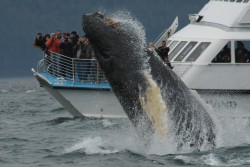This year, while preparing for my Alaska trip, I packed what I regard as normal camping gear for living under the stars. I had become aware of some islands where bears don't live, islands that seemed well-suited for camping, and I wanted to try camping out the old-fashioned way.
During my Alaska cruises I'm normally on the boat every night, but this year I thought it might be a nice change to get off the boat somewhere, preferably in a pretty, wild place. Based on pleasant experiences I chose Naked Island in Prince William Sound, a fairly large island with no human occupants (and no bears).
Despite its name Naked Island is rather brushy and difficult for the most part, but there are some long stretches of muskeg one can walk along, to avoid having to constantly wade through thick brush. Over the years I've come to appreciate this island for its wildness and its views of the surrounding area. And, typically for Alaska, this pretty island is just ... there. Few people even know about it, and apart from a relay station there are no signs of mankind. No one is going to bother you or ask what you're doing there.
A bit of a digression. As the years have gone by I've noticed an unmistakable trend — there are fewer and fewer places like Naked Island, somewhere you can just go and walk around without being chased off by either a government official or a private land owner. I can't tell you how many places I've lived where one of the inital attractions was access to wild land, but as time passed that access evaporated.
This tendency to seal the land away from the people isn't universal. I visited Germany during my around-the-world sail, and I quickly learned that a private land owner may not prevent access to public lands, indeed he must allow people to pass across his land if there is no other way to gain access. For one reason or another this tradition hasn't taken hold in the U.S., and worse, I've noticed an increasingly aggressive exclusion policy by various U.S. government land agencies, which calls into question the meaning of "public land."
I don't expect to be able to change government policy. I'm going to enjoy Naked Island while I can, but I won't be surprised if it suddenly becomes forbidden territory. Alaskans may think that prospect is unlikely, but contrary to a popular impression, Alaska is more urban than a lot of lower-48 regions — about half of Alaska's population lives in and around the city of Anchorage.
I've hiked around on Naked Island regularly for about five years now, taken interesting wildlife pictures, had plenty of adventures, and ... never met a living soul. Perfect.
|
|
Naked Island: a muskeg patch with a view
|
Naked Island: mama ptarmigan
|
Naked Island: ptarmigan chick
|


 Share This Page
Share This Page

 Share This Page
Share This Page


 Share This Page
Share This Page